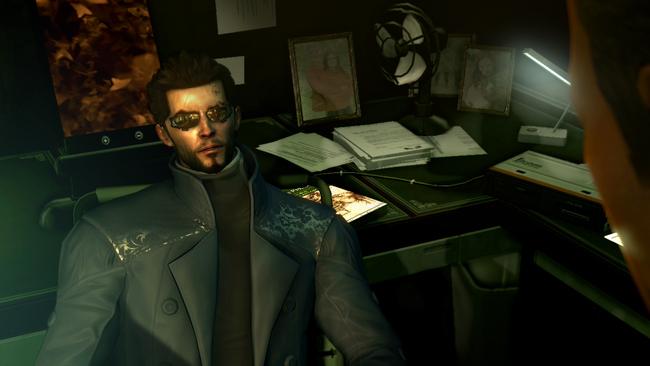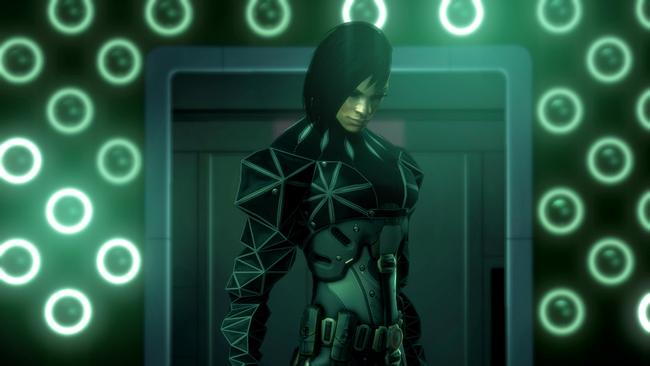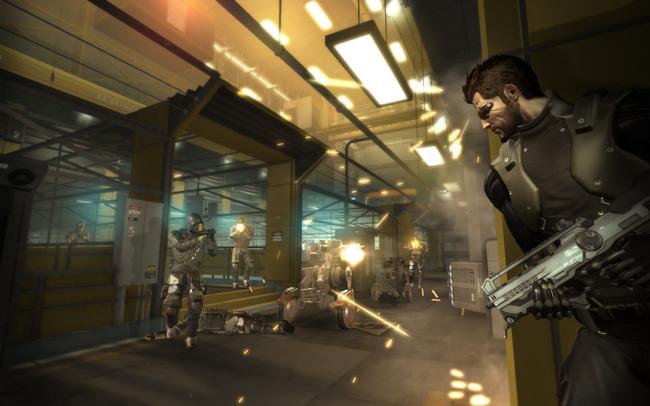Deus Ex: Human Revolution Console Review
Deus Ex: Human Revolution is a strange game to be released in 2011. As addictive as it is and as wrapped in current-generation trappings as it is something about it still feels distinctly like a classic, old-school PC game – and that helps it to remain a more faithful sequel to the original classic than the second game in the series ever was.
The game's RPG elements come not only in the decently-sized skill tree that lets you spec lead man Adam Jensen in a variety of different ways but also in the way you play. You can tackle all side quests the game throws at you or ignore them, and even those can be completed by merely shooting those involved and looting their bodies if you're feeling particularly lazy and evil.
Choices in Human Revolution seem to be more granular than other choice based games that have been recently released, so rather than effecting things on a game-wide level they tie into achievements or specific quests later on rather than leading up to massively different end-games.
While the game does feature several different endings, they can all be accessed by making a different choice right at the end of the game, and is not affected by your choices earlier on. Despite that, choices do feel like they matter, and I was clear in trying to play Jensen as I saw him - not killing unless he absolutely had to, and not carrying around tons of hardcore weaponry.

Character Progression matters, but overall this is a role playing game that's defined by the role you play rather than stats, figures and character progression. This is something that isn't around enough in the modern age, and so Human Revolution provides something special there.
We've already covered a lot of that in our main review, but before getting on to the nitty gritty of the different versions of Deus Ex: Human Revolution available, I wanted to speak a little on my personal experiences of that stuff as Erren did last week.
The great thing about Human Revolution's gameplay is that it has that sense of open-ended control that so many games recently lack. From moving and hiding behind boxes to participating in hacking minigames that actually have a sense of challenge to them to tricking the sometimes-intelligent sometimes-stupid AI, I was reminded of some of the best experiences I had in classic choice-based RPGs like the original Deus Ex.
Some reviews have seen fit to criticize the AI, but I see it as 'deliberately' flawed - it pays off to learn some of the foibles of the AI and exploit them to your advantage, especially later in the game. That only adds to the sense of exhilaration as you sneak past them or trick them by making clever use of their routines - long story short, its fun.
The issues I do have come from the animation and presentation. There's a strange disconnect between some pre-rendered story scenes and in-game story scenes. With the pre-rendered ones using in game assets, I wonder why they're not real time. While these sequences boast awesome animation and solid direction, many do little that couldn't be managed real-time. A huge, wide shot of a helicopter flying into a futuristic city is understandably pre-rendered, but a simple shot of Jensen entering a LIMB clinic which you'll be walking around in real time in a few moments isn't.
These don't seem to be masking load times in any significant way, so I find the choice strange. Weirder still, sometimes the lighting between the pre-rendered sequence and the same area in real-time is dramatically different, almost like the video sequences were captured from a version of the game with a different lighting model. It's strange.

The sometimes-stiff animation and up-and-down voice work has been widely discussed in Erren's review, but things like this hold Deus Ex: Human Revolution back from being a bastion of perfection. It's still an excellent, brilliant game, but the presentation smacks of older releases, which might well be down to Human Revolution's long development time.
I've now completed playthroughs on both the PS3 and Xbox 360 as well as spent a decent chunk of time with the PC version for comparison purposes, and so now I'm well equipped to talk about the differences between the versions.
The interesting thing about the PC version of the game is that is actually the one that's an external port. Eidos Montreal created the PS3 and 360 versions in-house but farmed the PC port out to another developer, Nixxes, who did a fantastic job.
The good news on this front is that this left the team at Eidos to focus themselves on ensuring the console version was top-notch. As a result this is the opposite of the version comparison we did for Square Enix's Final Fantasy XIII - the differences between the PS3 and 360 versions of Human Revolution are pretty muted.
There's really not much to tell - both have a solid and similar frame rate and both run smoothly. There are dropped frames, but they seem to happen in similar or identical places in both versions The issues with compression in things like those aforementioned pre-rendered story sequences are present in all versions of the game, so even those problems are platform agnostic, including PC.
The lighting feels a little more muted on the PS3, with everything looking a little lighter in colour in general. While the Xbox 360 version looked a little richer in colour, I also had to turn up the in-game brightness because dark areas were pretty much unplayable on my set - the PS3 didn't have that issue.
The Xbox 360 version of the game has a strange issue where it locks up when checking if you have an achievement. Whenever you complete a task that awards an achievement - for example hacking 50 terminals in one playthrough - the game hangs for a moment while it works out if it needs to award you the achievement. This is absent on PS3 with the game awarding Trophies seamlessly.

The PS3 version of the game requires a mandatory install of around 2.9 GB while the Xbox 360 version doesn't have an install by default. If you're so inclined you can of course can use Microsoft's standard systems to install the entire disc at the cost of 6.8 GB of hard drive space.
Xbox 360 owners will definitely want to install the game if they can - if not, they'll be facing load times of between 25 and 35 seconds every time you enter a major-sized area. When installed those load times are reduced to under the 20 second mark. That brings the Xbox 360 version to overall be the quickest - the PS3 version tends to hover between 20 and 25 seconds, even with its mandatory install.
The PC version actually suffered from the same kind of times, but has since been issued with a patch that reduces load times if you're on a higher end rig, which is a very welcome addition.
The last major difference from the PC version Erren played through of course comes in the controls. With Eidos Montreal developing primarily for consoles, the controls are tight, responsive and satisfying on console. With the core mechanics of this game matching up to a lot of shooters, the 360 and PS3 controllers both work great.
Issues come in areas which were pulled right from the first Deus Ex - manually typing passwords into keypads or keyboards of computers requires the use of a clunky on-screen keyboard - not ideal when you're trying to hack or use a PC quickly while a guard's back is turned.
Similarly, the hacking minigames are just easier with a mouse, as is inventory management and those kinds of things. In many ways this can't be helped, but as it turns out the best possible way to play this game if you can is on a PC with an Xbox 360 controller plugged in - the game has native support for it, and so you get the best of both worlds.
It'll come as no surprise that the best version of Deus Ex: Human Revolution to play is the PC one. The extra power a decent PC affords can help blast through some of the performance issues the console versions have. What is a pleasant surprise is just how close the three versions of the game are - especially the two console versions. Eidos Montreal clearly put a lot of time in to hit feature parity, and it was definitely time well spent.
Remember - If you want the full lowdown on Deus Ex: Human Revolution's gameplay be sure to check out Erren's full review. We also interviewed the guy behind the voice of leading man Adam Jensen, so you can check that out too.